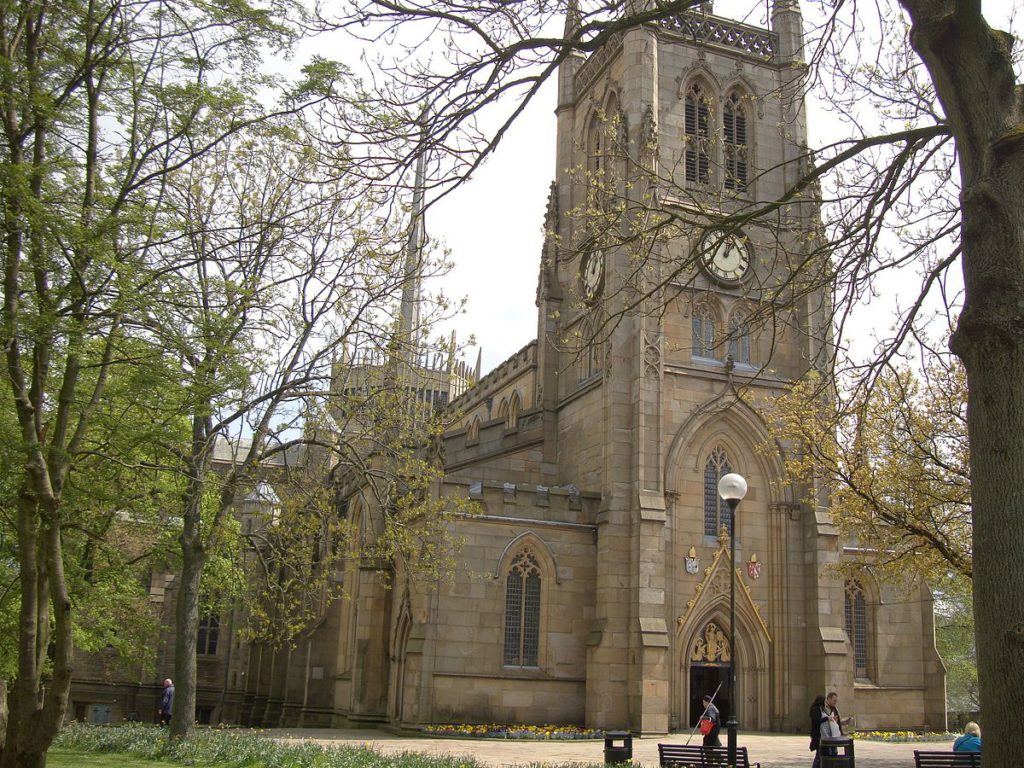Seventh Bastard! March 29, 2018
Author: Beach Combing | in : Modern , trackbackThis is a scene that I recently ran across in the parish records and that I can’t get out of my head. It is Sunday morning 14 Oct 1855, and we are at the impressive Church of St Mary the Virgin, Blackburn in Lancashire, England. At the baptismal font waits the local vicar John Arthur Rushton: a typical mid Victorian Anglican who has somehow got himself a Wikipedia page. (The closest thing to heaven in the New World Order). John looked down the list of those to be baptised and, to order, a woman scouts across the knave with a three-month-old baby in her arms. Rushton’s mouth drops open. It is her! Again! The sinner, Margaret Counsel.
We know this scene from a Lancashire mill town because the normally patient Rushton, lost it during the ceremony. After, we imagine, furiously going through the motions of welcoming the tiny tot into the Christian community, he wrote into the margin of his register: ‘the seventh bastard child, by the Mother’s own confession.’ (Actually it was her eighth but Margaret wisely said nothing.) It is very rare for English vicars to write anything but the skeleton facts into an official record in the nineteenth century. Combing through the Online Parish Clerks for Lancashire database there is, in the 1800s, only one other record of anything like this: in 1831 Elis Nutter was born to Mary Nutter and Giles Green in Salford. John Johnson the curate wrote in the margin: ‘Mary’s third bastard. A married man.’ A mere raised eye-brow compared to Rushton’s outburst.
Margaret Counsel got this blogger’s curiosity going. Who was she? Why did she do it? Did she care? The census records show that she was born about 1816, though in practically every census Margaret changes the location of her birth. She had her first illegitimate child in her late teens, and in the 1841 census, aged about twenty five, she was out to work in a solictor’s house as a servant. In the 1851 census she had three children living at home with her parents; but she lived apart with a man called William Counsell with four children.* Then, in the 1861 and 1871 census she was living with William.
I have tried and tried to explain to myself how her husband had her name. He too changes in every census his place of birth: it is as if the two had something to hide… The most economical explanation is that he was a cousin. A more devious one is that a man adopted his wife’s name to make an honest woman of her. Perhaps there was a retrospective claim that Margaret had had a husband all along? The division of households in 1851 is very strange.
Any other ideas: drbeachcombing AT gmail DOT com
*If I read this in your blog I’d assume that were two different individuals with this name but I’ve cross-referenced the children with care. Margaret appears twice in the 1851 census. For anyone who want to check my math:
Parish records of baptisms to Margaret Counsell (spinster): John 1839; John 1840; Anne 1843; Thomas 1847; Adam 1849; Richard 1850; John 1852; Doctor 1855.
1851a: John (12), Ann (8), Richard (3).
1851b (with William): Peter (17); James (6); John (4); Alice (2)
1861 (with William): James (15); John (14); Richard (9); Mary (7); Doctor (6); Thomas (4).
29 Mar 2018: Bruce T is credible: Another angle to consider. This is the period just before regular police photography and fingerprinting, it existed, but it wasn’t widely used. A man can get in some trouble, beat it to new parts, start using the mother of his children’s last name, and simply wait for them to come join him. There is no way to prove he isn’t who he says he is. People had been pulling it for millennia in the three mile an hour world that preceded the 1830’s and the coming of the railroads, telegraphs, and improving roads, all barely out of their infancy in 1851. No questions about the names of the wife and kids where you relocate to as you’re already using the surname. You’re now just another of the Bill Counsel’s that overrun that part of Lancashire. People still pull it here, but we’re a more populated and much larger country. More places to flee to and a larger population to disappear into. What trips them up is contacting people from their former lives. Those kind of tales are in the papers regularly where the guy gets caught because he calls an old flame or a relative. It always amazes me.
29 Apr 2018: Neil H noting that marginalia not that rare: ‘Depends on the vicar. I know of more, but not online’
29 Apr 2018: Meanwhile, I [Beach] ran across in Ash, Potty, Fartwell and Knob, p. 47 ‘The parish record also states ‘1627 – buried neglected, the daughter of Jeffrey Heaks, the 11th of February, and she was so named because she had no God father or God mother prepared at the time of Baptizing’. She only lived a few days.




